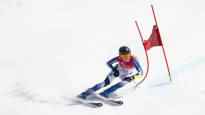Finland’s six-man Paralympic national team will come home with four medals. Tuomas Törrönen, Coaching Manager of the Paralympic Committee, and Kimmo Mustonen, Team Leader, were pleased with the result. Meanwhile, China made an incredible leap in the medal tables.
Riku Salminen,
Maija Kautto,
Sam Such
The Beijing Paralympics are over and the Finnish competition team will certainly be satisfied with their performance in the Games. The team of six Finns eventually brought home a total of four medals, two of which were gold.
The medals went to two men. Matti Suur-Hamari dropped gold on a snowboard cross and silver on a banked slalom. Santeri Kiiveri in turn, he sledged Paralympic gold and took the silver in the Super Alpine United.
Coalition Manager of the Paralympic Committee Tuomas Törrönen is pleased to look at the Finnish successes of the Games.
– These competitions were definitely sportingly successful, especially when viewed successfully. For twenty years, Finland has not done so well in the winter races. Especially considering the size of the team, this is a great performance, in addition to the two medal winners, we also got two points, Törrönen said in a smile in an interview with the Sports Studio.
Zhangjiakous, the team leader of the Paralympic national team, also said the same thing on the spot Kimmo Mustonen.
– You can be really happy with that. It’s great that Santeri took his place as a medalist when he was fourth in his race as a young boy in Pyeongchang, Mustonen praised the 21-year-old alpine skier in an interview with Sport.
Although the medals were left in the hands of only two Finns, Törrönen believes that the contribution of the entire team cannot be underestimated.
– Paralympic athletes always have different stories behind them. Success does not have to be measured by medals alone. When it comes to athletes with traumatic injuries, for example, it is a victory to be involved in the Paralympic Games and at the same time highlight the position of paralyzers, Törrönen reflected.
Törrönen especially wanted to lift snowboarders Matti Sairanen and Tomi Taskisen behind the medalists as the success of the Games. Sairanen’s and Taskinen’s attitude was very important to the team.
– In addition, Sairanen really liked the Chinese because he speaks Mandarin Chinese fluently, Törrönen said.
More athletes are needed for skiing
The next Winter Paralympics are ahead four years after the Milan-Cortina Olympics. Finland is promised nice medal opportunities, especially when carried by Kiiveri at that time. At the same time, the goal is to increase the number of athletes in future competitions.
– That is strongly intended. For example, our curling team, which has been involved in two previous competitions, was missing from these finished races. We want them to come to the upcoming Games. In addition to Santer, alpine skiing Nette Kiviranta makes a hard rise towards the top, team leader Mustonen says about the future.
– Of course, it is always our challenge to get new athletes for the next competitions. It is an eternal problem that we must always work on, Mustonen adds.
Törrönen, Coaching Manager of the Paralympic Committee, sees that Finland has room for improvement in terms of the number of participants, especially in cross-country skiing.
Ink Inola competed in Beijing as the only skier in Finland, ranking fourth at best in its traditional journey in the visually impaired class. However, Finland has a long tradition in cross-country skiing at the Paralympics, with 163 of all 191 blue-and-white Paralympic medals being won by skiers.
– Until the 2002 Salt Lake City Games, there were plenty of skiers and medals, both of which have been more isolated in the last twenty years. But, never before have so few Finnish cross-country skiers been involved. There are certainly many reasons for this in the way people apply for the path of a disabled athlete, Törrönen ponders.
China’s Great Paralympic Leap
According to Törrönen, the problem is not only in Finland. Sweden and Norway have also significantly reduced the size of their Paralympic teams from traditional ski countries. Norway, for example, brought only one medal from the entire race, which came from alpine skiing.
Instead, China, the host of the race, took the leaps in the race. The country had previously won only one Winter Paralympic Medal. Now it was the whole medal group of the Games, with Chinese athletes bringing in a total of 61 medals, of which 18 were Paralympic cults.
– The state is behind it. They have also invested in athletes on the Paralympic side, in the same way as in the Olympics. This did not come from the bush, but it was known in advance. Still, this was the first time: they didn’t take part in any of the World Cups at this Paralympic, but came from hiding here. The rhythm was a little harder then than even expected, Törrönen sheds light on China’s soaring rise.
– These competitions brought Ukraine the best medal result ever in the winter competitions. They have always been tough in biathlon, and now, by chance, when the Russians were excluded from the competition, an all-time medal seam was opened for the Ukrainians, Törrönen says.
– I think it is great that they were able to make such a result in spite of everything. Their journey here was at stake and they finally arrived at the race just a couple of days before the opening. For myself, the biggest thoughts now are what’s going on for their 20 athletes and nine guide athletes, where they’re going to travel and what their future holds, he finally thinks.
